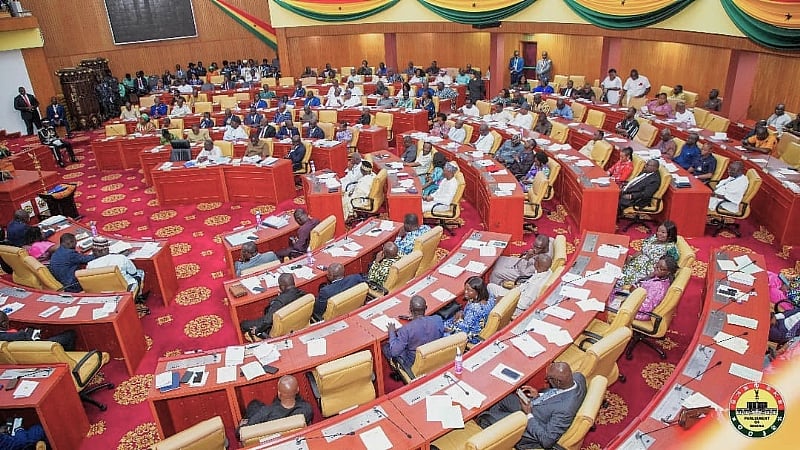The Ghanaian Parliament witnessed a fiery exchange between the Minority and Majority Caucuses during the conclusion of the 2025 mid-year budget review debate. The contention arose from the Deputy Minister of Finance, Mr. Thomas Ampem Nyarko’s response to criticisms raised by the Minority during the debate. Minority Leader, Osahen Alexander Kwamena Afenyo-Markin, accused the government of stifling parliamentary procedures and denying Minority members a fair opportunity to respond to the Deputy Minister’s rebuttals. Afenyo-Markin argued that the established parliamentary process involves both sides presenting their arguments during the debate, followed by a concluding statement. However, he contended that the Deputy Minister’s approach of directly addressing each Minority member’s contribution individually, without offering them an opportunity for immediate rebuttal, undermined the principles of fair hearing and proportional representation within the parliamentary discourse.
The Minority Leader stressed that such a practice creates an imbalance in the debate, effectively silencing the opposition and preventing them from clarifying their positions or challenging the Deputy Minister’s assertions. He emphasized the importance of adhering to parliamentary norms and ensuring that all members are given equal opportunities to participate in the debate. Afenyo-Markin’s concerns underscored the broader issue of ensuring a balanced and respectful dialogue within Parliament, a cornerstone of a healthy democratic process. His argument centered on the principle that parliamentary debates should not be dominated by one side, particularly when the government holds the majority. He argued that allowing the Deputy Minister to individually address and rebut each Minority member’s contribution without giving them a chance to respond effectively amounted to a muzzling of the opposition’s voice.
Adding fuel to the fire, Dr. Abdul Kabiru Tiah Mahama, the NPP MP for Walewale, further accused First Deputy Speaker Bernard Ahiafor of bias in favor of the Majority Caucus. Dr. Mahama alleged that the Deputy Speaker’s conduct during the debate indicated a clear partiality towards the government, compromising his role as a neutral arbiter of parliamentary proceedings. He highlighted the Deputy Speaker’s apparent facilitation of the Deputy Minister’s approach, preventing the Minority from exercising their right of reply. Dr. Mahama argued that this alleged complicity further undermined the democratic process and contributed to the perceived imbalance in the parliamentary debate.
Dr. Mahama’s accusation of bias against the First Deputy Speaker highlighted a critical element of parliamentary procedure: the impartiality of the presiding officer. The Speaker or Deputy Speaker plays a crucial role in ensuring fair debate and adherence to parliamentary rules. When the impartiality of the presiding officer is questioned, it casts a shadow over the legitimacy of the entire process. This underscores the importance of the Speaker maintaining neutrality and ensuring all members have equal opportunity to express their views, regardless of their political affiliation. Any perceived bias on the part of the Speaker can undermine the public’s trust in the integrity of the Parliament.
The walkout by the Minority Caucus, following these accusations, underscored their deep dissatisfaction with the proceedings. They perceived the government’s actions as a deliberate attempt to suppress dissenting voices and manipulate the parliamentary process. The walkout served as a symbolic protest against what they considered to be an affront to democratic principles and a blatant disregard for the established norms of parliamentary debate. The Minority’s actions signaled their refusal to participate in a process they deemed unfair and biased, further emphasizing the importance of upholding parliamentary traditions and ensuring fair representation for all members.
The incident highlighted the critical role of Parliament in upholding democratic values and ensuring accountability within the government. The Minority’s concerns regarding the Deputy Minister’s approach and the alleged bias of the First Deputy Speaker raised fundamental questions about the government’s commitment to transparency and fair debate. The walkout underscored the fragility of democratic processes and the constant vigilance required to safeguard them. The events of that day served as a reminder of the importance of open dialogue, respect for dissenting views, and the crucial role of an impartial Speaker in maintaining the integrity of parliamentary proceedings. The incident called for a critical reflection on the conduct of parliamentary debates and the need to strengthen mechanisms that ensure fairness, balance, and respect for all participating members. The Minority’s emphasis on accountability and transparency underscores the importance of these principles in fostering a healthy democracy and maintaining public trust in the government and its institutions.


